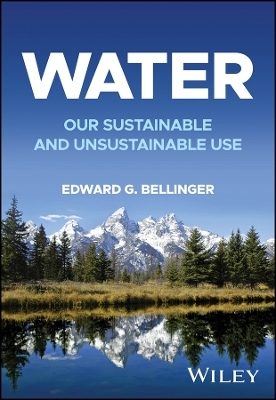
Water
John Wiley & Sons Inc (Verlag)
978-1-118-79718-1 (ISBN)
A holistic approach to humanity’s global use and management of water resources
In »Water: Our Sustainable and Unsustainable Use«, distinguished environmental researcher Edward Bellinger delivers an unbiased and scientifically accurate exploration of every major area of the management and use of water by human beings. Readers will benefit from a coordinated and holistic approach to the subject, including sections covering needs, availability, governance, public health engineering, economics, the potential effects of climate change, water management, and sustainability, allowing the reader to understand the big picture of global water use under conditions of declining water resources.
Assuming only basic knowledge in hydrology, »Water: Our Sustainable and Unsustainable Use« is international in scope and includes case studies from across the globe.
The book also offers:
- A thorough introduction to human and ecological water needs and how they interact
- A discussion of available water resources and systemic problems of water quality
- A comprehensive analysis of the human water footprint and factors driving water demand in modern society
- An overview of the technological aspects of drinking water supply and sanitation, as well as the governance and management of water
Edward G. Bellinger is the former Chair of the Department of Environmental Sciences and Policy at Central European University in Vienna (Austria). He is the former Director of Pollution and Environmental Studies in the School of Biological Sciences at Manchester University (UK).
About the Author xi
Preface xiii
Acknowledgements xv
Introduction 1
References 5
1 Our History with Water: What Can Be Learned from Past Water-based Communities 7
Mesopotamia 8
Qanats 11
Egypt 12
Ancient Greece 14
Classical Greece and Roman 16
Roman Empire 16
Ancient American Civilisations 20
Some of the Changes from the Thirteenth to Nineteenth Centuries 23
What Can We Learn from These Ancient Approaches to Water Management? 25
References 27
2 Water Movement in Time and Space 31
Atmospheric Water, Clouds and Precipitation 36
Spatial Variations in Precipitation and Run-off 37
Groundwater 42
Water Movement Through Evaporation and Precipitation 44
Glaciers, Ice Fields and Snow Melt 45
Groundwater 47
Rivers, Lakes and Reservoirs 50
Rivers 50
Lakes 52
Lakes and Reservoirs 57
References 59
3 Human Needs and Water Demands. How Much Water Do We Need? 63
Our Basic Water Needs 64
Our Right to Water 65
Basic Water Requirements 69
Factors Driving Water Demand 70
Water Withdrawals and Use in the United States 71
Sectoral Water Demand and Consumption 77
Agriculture 77
Energy 80
Industry 82
Humans and Human Settlements 82
Water Abstractions and Use in Europe 86
References 88
4 Water Resources 93
The Driving Forces Behind the Global Climate 99
Evaporation and Precipitation 102
Glacier and Snowmelt 103
Groundwater 105
Surface Freshwater Resources 111
Lakes and Reservoirs 115
Sand Dams 117
Rainwater and Fog Harvesting 119
Rainwater Harvesting for Domestic Use 124
Rainwater Quality 124
Floods and Droughts 125
Floods 125
Droughts 129
References 131
5 Water Scarcity 135
What Is Water Scarcity? 136
Our Right to Water 137
Water Availability, Demand and Allocation 138
Industry Demands 141
Municipal Water Demands 141
Water Demands for Agriculture 141
Estimating Freshwater Availability and Scarcity Using Indices 142
Falkenmark Index 144
Water Poverty Index (WPI) 145
Access 146
Water Quality and Availability 146
Water for Agriculture and Other Productive Activities 146
Capacity to Manage Water 147
Environmental Aspects 147
Questions of Spatial Scale 147
The Social Water Stress Index 152
Water Resources Vulnerability Index (WRVI) 153
Water Resources Availability and Food (Especially Cereals Imports) 154
Index of Local Relative Water Use and Reuse 154
Watershed Sustainability Index and Water Resources Vulnerability Index 156
Environmental Sustainability Index (ESI) 157
References 164
6 Water Quality: Some Management and Use Issues 169
Added Nutrients and Eutrophication 174
Phosphorus 181
Controlling Nutrient Inputs 182
Nitrogen 183
Eutrophication and Harmful Algal Blooms 191
Mitigation of Nitrogen and Phosphorus Inputs to the Environment 193
Artificial Mixing 198
Dredging 200
Algicides 200
Examples of European and United States Regulations and Regulatory Authorities Responsible for Water 202
Local Water Agencies 209
Municipal Water Departments 209
Water and Sewer Districts 209
Flood-control Districts 209
Mutual Ditch and Irrigation Companies 209
Regional Water Agencies 210
Conservancy Districts 210
Natural Resource Districts 210
Groundwater Management Districts as in Kansas 210
State Water Agencies 210
Multistate Water Agencies 211
Missouri River Basin Association 211
The Ogallala Aquifer 212
References 215
7 Drinking Water Treatment 221
Aims for Provision of Drinking Water and Sanitation 222
Drinking Water Treatment 233
Pre-treatment 241
Screens 241
Filtration 247
Sand Pre-filters 248
Activated Carbon 251
Ion Exchange 252
Membrane Filters 253
Microfiltration 256
Ultrafiltration 257
Nanofiltration 257
Reverse Osmosis 258
Membrane Integrity 258
Backwashing 258
Coagulation and Flocculation 259
Dissolved Air Flotation (DAF) 261
Slow Sand Filtration 266
Chemical and Microbiological Actions 269
Natural Organic Matter 270
Arsenic removal 274
Cleaning a Slow Sand Filter 276
Disinfection 277
Ultraviolet Radiation 277
Ozone 279
Chlorine 281
Disinfection By-products of Chlorination 283
Sodium Hypochlorite and Calcium Hypochlorite Disinfectants 283
General Considerations for Disinfection 284
References 285
8 Wastewater Treatment 291
Preliminary Treatment: Screening and Grit Removal 296
Storm Water 298
Primary Sedimentation 298
Activated Sludge (AS) Process 299
Diffused Air 299
Surface Aeration 301
Vertical Shaft Rotors 301
Horizontal Shaft Aerators 302
Mixed Liquor Suspended Solids 304
Biological Filtration 304
Possible Problems with Filters 308
Humus Tanks (Secondary Sedimentation Tanks) 309
Rotating Biological Contactors (RBC) 310
Sludge Treatment and Disposal 311
Waste Stabilisation Pond Treatment 312
Anaerobic Ponds 314
Facultative Ponds 314
Maturation Ponds 315
Water Storage and Treatment Reservoirs 315
Constructed Wetlands (CWs) 316
Vertical Flow Wetlands 318
Septic Tanks 321
Disposal of Sewage Sludge 322
Incineration 322
Disposal to Land 323
Disposal to Agriculture 324
References 327
9 Climate Change and Its Implications for Freshwater in the Future 331
Impacts on Human Settlements 338
Precipitation 340
Streamflow 342
Groundwater 344
Changes in Water Quality 344
Droughts 345
Climate Change and Freshwater and Terrestrial Ecosystems 348
Inland Fisheries 350
Effects on Agriculture and Food 352
References 354
10 Sustainability: The Way Ahead and Can We Achieve It – A Summary 361
Virtual Water and Water Footprint 365
Reducing Water Demand 367
Domestic Water Saving Strategies 370
References 373
Glossary 377
Index 383
| Erscheint lt. Verlag | 17.10.2024 |
|---|---|
| Verlagsort | New York |
| Sprache | englisch |
| Maße | 165 x 244 mm |
| Gewicht | 771 g |
| Einbandart | kartoniert |
| Themenwelt | Naturwissenschaften ► Biologie ► Ökologie / Naturschutz |
| Naturwissenschaften ► Geowissenschaften ► Hydrologie / Ozeanografie | |
| Technik ► Bauwesen | |
| ISBN-10 | 1-118-79718-3 / 1118797183 |
| ISBN-13 | 978-1-118-79718-1 / 9781118797181 |
| Zustand | Neuware |
| Informationen gemäß Produktsicherheitsverordnung (GPSR) | |
| Haben Sie eine Frage zum Produkt? |
aus dem Bereich


